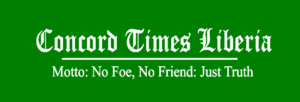In a bold social media post, former Liberian Auditor General John Morlu has once again criticized President Joseph Boakai’s administration, voicing serious concerns about the country’s economic management. Morlu’s remarks underscore what he perceives as “dangerous precedents” in the handling of bank guarantees and a lack of transparency in government financial practices.
Morlu’s statement begins with an appeal for open dialogue regarding Liberia’s economic challenges, acknowledging that many citizens feel constrained in their ability to express concerns due to fear of repercussions. He points out the troubling trend of individuals distancing themselves from dissent to protect their jobs or gain favor with those in power.
Expressing gratitude to the International Monetary Fund (IMF) for its responsiveness, Morlu highlights the organization’s recent decision to condition the release of $209 million to the Boakai administration on a comprehensive review of loan guarantees issued by the Central Bank of Liberia (CBL). He views this as a crucial step in safeguarding the nation’s economic future.
The former auditor general cites the CBL’s history of bailing out commercial banks due to loan defaults, referencing specific incidents under the previous administration. He recounts the dismissal of the young president of LBDI after he exposed loan defaulters—many of whom were political figures—illustrating how corrupt practices have plagued Liberia, leaving ordinary citizens to bear the financial burden.
Morlu points to recent significant financial guarantees and bailouts as evidence that the current administration is perpetuating the same corrupt practices that afflicted its predecessors. He specifically calls out Senior Economic Advisor Morley Kamara, demanding transparency regarding allegations of financial misconduct and raising questions about the integrity of recent bailouts.
He warns that if dissenting voices continue to be silenced within Liberia, he and his allies will take their fight against corruption to international platforms, leveraging connections with influential institutions in Washington, D.C., and Brussels.
As the new officials in the Ministry of Finance and the Central Bank take office, Morlu urges them to adopt a proactive approach toward financial accountability, ensuring all outstanding loans are repaid and corrupt practices are eliminated.
“We must continue the fight—both here and abroad—for Liberia’s future,” writes Morlu. He concludes with a call for President Boakai to embody the principles of good governance, expressing hope that his administration can bring about meaningful change.
As the political landscape in Liberia continues to shift, Morlu’s pointed critique highlights the urgent need for accountability and transparency in governance, as citizens closely monitor the actions that will define the Boakai administration’s legacy.








